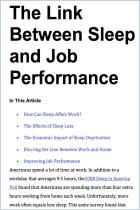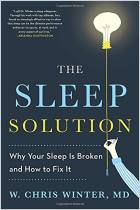
Article
The Sleep Debt Collector Is Here
Recent studies in humans and mice have shown that late nights and early mornings may cause long lasting damage to your brain.
The New York Times,
2022
Recommendation
Have you ever told yourself “I’ll catch up on my sleep later,” while staying out late and cutting back on your sleep? New York Times reporter Oliver Whang lays out the conclusions of a new sleep research review. Neuroscientist Sigrid Veasey and researcher Zachary Zamore found consistently reducing sleep hours might cause long-term brain damage and increase the risk of neurodegenerative diseases such as Parkinson’s. They debunk the myth that sleep debt is something you can pay off.
Summary
About the Author
Oliver Whang is a reporting fellow for The New York Times.
Learners who read this summary also read
Article
Article
Article
Article
Book













Comment on this summary